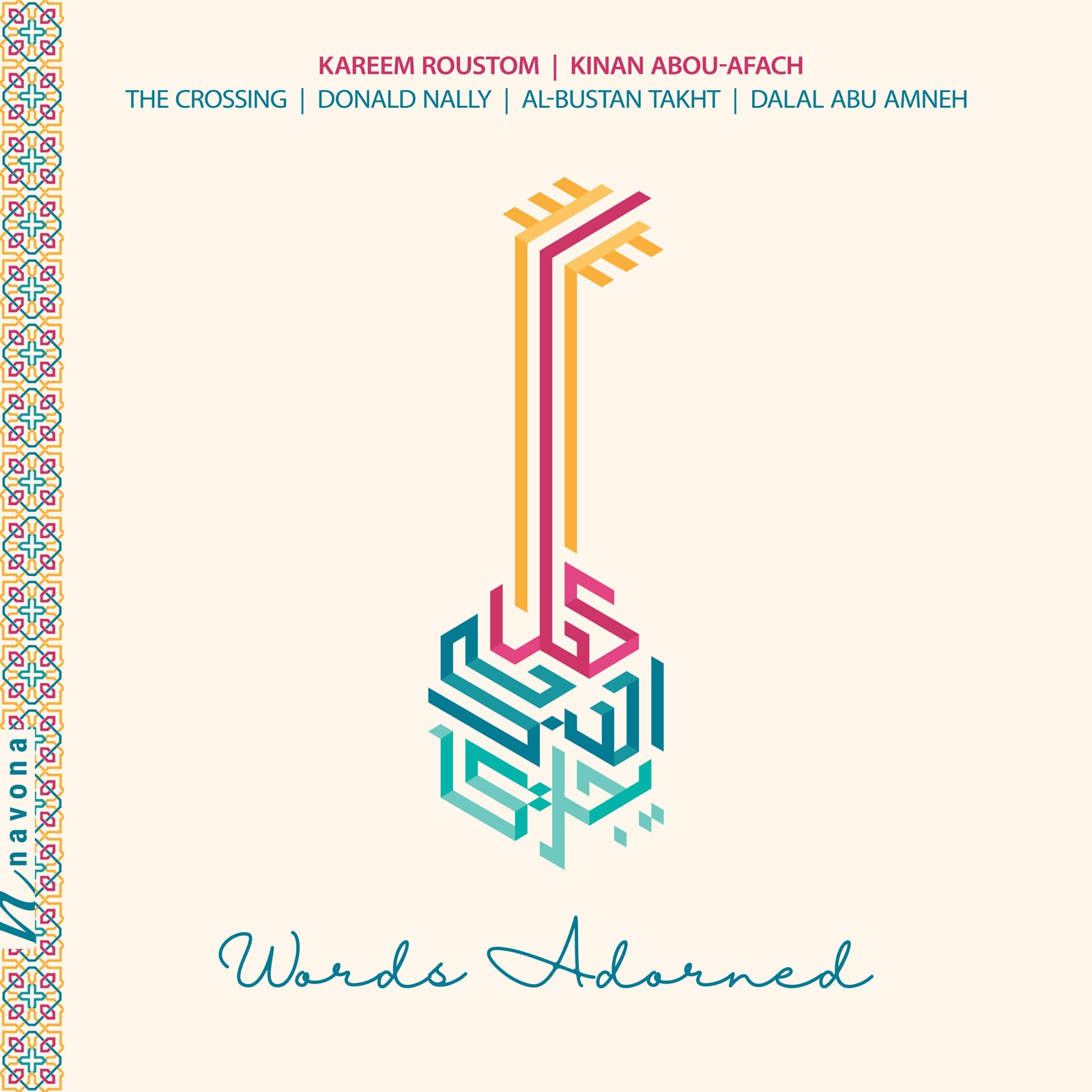Words Adorned
Kareem Roustom composer
Kinan Abou-afach composer
The Crossing | Donald Nally conductor
Al-Bustan Takht | Hanna Khoury music director
Dalal Abu Amneh soloist
The Grammy-winning professional chamber choir The Crossing, Al-Bustan Seeds of Culture, and Navona Records present WORDS ADORNED. Conducted by Donald Nally, with Takht musical direction by Hanna Khoury, the combined forces interpret lush scores from Kinan Abou-afach and Kareem Roustom; the music is at times driven and passionate, at others mystical and lyrical, responding to ancient Andalusian poetry in the Muwashshah tradition. The takht – masterfully handling the oud, qanun, violin, cello, and percussion – guides the kaleidoscopic sounds and colors in these poems of love, revelry, and war, with additional solo work by the virtuosic singer Dalal Abu Amneh. True to their commitment to honor tradition while constantly blazing new ground, The Crossing’s latest offering is steeped in history, deeply relevant to modern listeners, and bridges cultures seamlessly.
Listen
Stream/Buy
Choose your platform
One of the most fascinatingly original large-ensemble albums of recent months
"One comes away from the work struck by the delicate balance Abou-afach enacted between Abu Amneh, Takht, and The Crossing"
Track Listing & Credits
| # | Title | Composer | Performer | |
|---|---|---|---|---|
| 01 | Embroidered Verses: No. 1, Oh People of Andalusia, What Beauty You Have (Live) | Kareem Roustom | The Crossing | Donald Nally, conductor; Al-Bustan Takht | Hanna Khoury, music director; Dalal Abu Amneh, soloist | 5:24 |
| 02 | Embroidered Verses: No. 2, Arise Oh Drinking Companion (Live) | Kareem Roustom | The Crossing | Donald Nally, conductor; Al-Bustan Takht | Hanna Khoury, music director; Dalal Abu Amneh, soloist | 3:55 |
| 03 | Embroidered Verses: No. 3, Oh People, Stop and Wonder (Live) | Kareem Roustom | The Crossing | Donald Nally, conductor; Al-Bustan Takht | Hanna Khoury, music director; Dalal Abu Amneh, soloist | 3:51 |
| 04 | Embroidered Verses: No. 4, Tell the Enemy (Live) | Kareem Roustom | The Crossing | Donald Nally, conductor; Al-Bustan Takht | Hanna Khoury, music director; Dalal Abu Amneh, soloist | 5:54 |
| 05 | Of Nights and Solace: No. 1, Prelude. Moonrise (Live) | Kinan Abou-Afach | The Crossing | Donald Nally, conductor; Al-Bustan Takht | Hanna Khoury, music director; Dalal Abu Amneh, soloist | 2:37 |
| 06 | Of Nights and Solace: No. 2, Greet These Faces (Live) | Kinan Abou-Afach | The Crossing | Donald Nally, conductor; Al-Bustan Takht | Hanna Khoury, music director; Dalal Abu Amneh, soloist | 5:48 |
| 07 | Of Nights and Solace: No. 3, Forsaken (Live) | Kinan Abou-Afach | The Crossing | Donald Nally, conductor; Al-Bustan Takht | Hanna Khoury, music director; Dalal Abu Amneh, soloist | 7:53 |
| 08 | Of Nights and Solace: No. 4, Interlude (Live) | Kinan Abou-Afach | The Crossing | Donald Nally, conductor; Al-Bustan Takht | Hanna Khoury, music director; Dalal Abu Amneh, soloist | 2:37 |
| 09 | Of Nights and Solace: No. 5, You Who Left and Passed (Live) | Kinan Abou-Afach | The Crossing | Donald Nally, conductor; Al-Bustan Takht | Hanna Khoury, music director; Dalal Abu Amneh, soloist | 5:16 |
| 10 | Of Nights and Solace: No. 6, Sunrise (Live) | Kinan Abou-Afach | The Crossing | Donald Nally, conductor; Al-Bustan Takht | Hanna Khoury, music director; Dalal Abu Amneh, soloist | 1:44 |
| 11 | When He Appeared (Live) | Muhammad ‘Abd Al-Rahim Al-Maslub | The Crossing | Donald Nally, conductor; Al-Bustan Takht | Hanna Khoury, music director; Dalal Abu Amneh, soloist | 3:52 |
THE CROSSING
Jessica Beebe . Karen Blanchard . Steven Bradshaw . Veronica Chapman-Smith . Jeffrey Cutts . Colin Dill . Robert Eisentrout . Ryan Fleming . Joanna Gates . Steven Hyder . Michael Jones . Heather Kayan . Heidi Kurtz . Frank Mitchell . Maren Montalbano . Rebecca Myers . Rebecca Oehlers . James Reese . Elisa Sutherland . Daniel Schwartz . Rebecca Siler . Julie Snyder . Daniel Taylor . Jackson Williams
Donald Nally conductor
Dalal Abu Amneh soloist
Al-Bustan Takht Ensemble
Hanna Khoury violin and music director
Wassim Odeh oud
Hicham Chami qanun
Kinan Abou-afach cello
Hafez Kotain percussion
Recorded December 4, 2015 at Goodhart Hall, Bryn Mawr College in Bryn Mawr PA
Live Sound Assistant Jonathan Orose
Recording Assistant James Clark Conner
Recorded, Mixed, Edited & Mastered by Joe Hannigan at Weston Sound
Artwork by Ashley Choukeir – ashleychoukeir.com
THE RECORDING was made and originally released as part of an Al-Bustan Seeds of Culture multimedia project inspired by Andalusian poetry, with a series of events and newly commissioned works bridging the traditions of East & West. This re-release on Navona Records is produced by Jonathan Bradley, Donald Nally, and Kevin Vondrak. Major support for WORDS ADORNED has been provided by The Pew Center for Arts & Heritage, with additional support from the Arab Fund for Arts & Culture and the William Penn Foundation.
The Al-Bustan team who has developed this project includes Founder/Executive Director Hazami Sayed, Music Director Hanna Khoury, Project Manager Ahmad Almallah, Marketing Director Morgan Gengo, Publicist Cindy Byram, Digital Designer Ayman Alalao, and Program Assistant Eman Haj. Ashley Choukeir and Hanane Kai created the graphic identity and designs, Dave Tavani created the series of videos documenting the process, Jasmine Erdener created the podcasts, and Joe Hannigan provided sound and audio recordings.
THE BOARD OF DIRECTORS OF AL-BUSTAN SEEDS OF CULTURE
Omar Harb, Chair
Regina Morgan, Treasurer
Lisa Denberry, Secretary
Tony Abraham
Veronica Aplenc
Mark Dato
Huda Fakhreddine
Georgette Hamaty
Sara Hasan
Mohannad Ghawanmeh
THE STAFF OF AL-BUSTAN SEEDS OF CULTURE
www.albustanseeds.org
Mohannad Ghawanmeh, Executive Director
David Heayn-Menendez, Director of Public Education
Bridget Peak, Programs Coordinator
Sahiti Bonam, Marketing Coordinator
THE BOARD OF DIRECTORS OF THE CROSSING
Kelly Ann Bixby
Phil Cooke
Micah Dingler
Shawn Felton
Tuomi Forrest – Vice President
Mary D. Hangley
Lisa Husseini
Cynthia A. Jarvis
Mary Kinder Loiselle
Michael M. Meloy
Donald Nally
Eric Owens
Pam Prior – Treasurer
Andrew Quint
James Reese
Kim Shiley – President
Carol Loeb Shloss – Secretary
John Slattery
Elizabeth Van de Water
THE STAFF OF THE CROSSING
Jonathan Bradley, Executive Director
Shannon McMahon, Operations Manager
Kevin Vondrak, Assistant Conductor & Artistic Associate
Paul Vazquez, Sound Designer
Katie Feeney, Grant Manager
Elizabeth Dugan, Bookkeeper
Ryan Strand, Administrative Assistant
The Crossing is represented by Alliance Artist Management
www.allianceartistmanagement.com
COME. HEAR. NOW.
www.crossingchoir.org
General Manager of Audio & Sessions Jan Košulič
Audio Director Lucas Paquette
Executive Producer Bob Lord
Executive A&R Sam Renshaw
A&R Director Brandon MacNeil
VP, Design & Marketing Brett Picknell
Art Director Ryan Harrison
Design Edward A. Fleming
Publicity Patrick Niland, Sara Warner
Artist Information
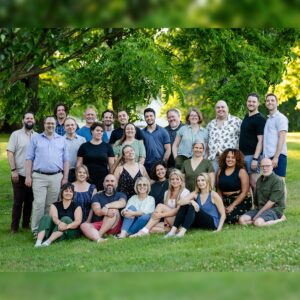
The Crossing
The Crossing is a professional chamber choir conducted by Donald Nally, dedicated to performing new music and committed to addressing social, environmental, and political issues through nearly 180 commissioned premieres. Collaborating with prestigious ensembles and venues like the New York and Los Angeles Philharmonics, Park Avenue Armory, Lincoln Center, and Carnegie Hall, The Crossing has released 35 albums, earning three GRAMMY® Awards for Best Choral Performance and multiple nominations. The Crossing is Musical America's 2024 Ensemble of The Year.
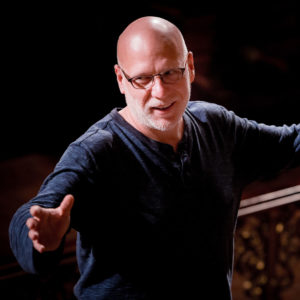
Donald Nally
Donald Nally collaborates with creative artists, leading orchestras, and art museums to make new works for choir that address social and environmental issues. He has commissioned nearly 200 works and, with his ensemble The Crossing (Musical America’s 2024 Ensemble of the Year), has produced 35 albums, winning three GRAMMY® Awards for Best Choral Performance, while nominated nine times.
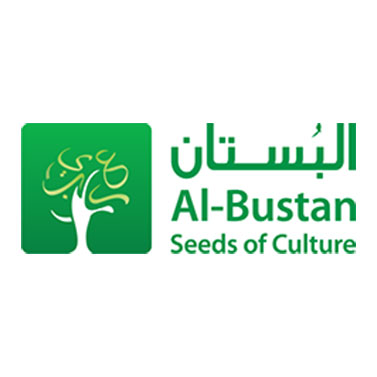
Al-Bustan Seeds of Culture
Rooted in Arab arts and language, Al-Bustan Seeds of Culture offers artistic and educational programming that enriches cross-cultural understanding and celebrates diversity. “Al-Bustan,” Arabic for “The Garden,” serves youth and adults of all ethnic, religious, and socio-economic backgrounds, while supporting the pursuit and affirmation of Arab American cultural identity and playing a constructive civic role within broader American society. www.albustanseeds.org
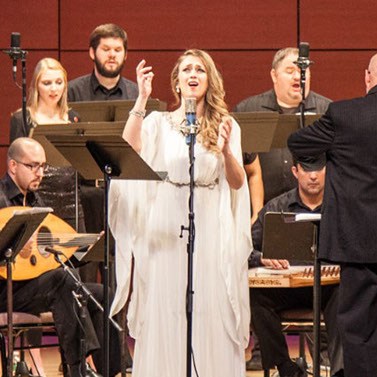
Dalal Abu-Amneh
Dalal Abu-Amneh is a singer, producer, neuroscientist, and a mother of two. Born in Nazareth in 1983, Abu-Amneh has been fascinated by both science and music since being a little child. Abu-Amneh has gained fame and praise for her ability to perform a wide variety of different musical styles, while crafting a global Palestinian identity through her music.
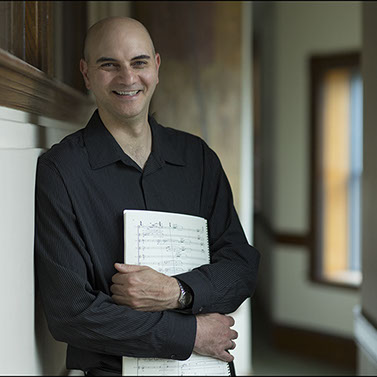
Kareem Roustom
Syrian-American Kareem Roustom is an Emmy-nominated composer whose genre crossing collaborations include music commissioned by conductor Daniel Barenboim and the West-Eastern Divan Orchestra, the Dallas Symphony Orchestra, as well as projects with pop icons Shakira and Tina Turner, and with acclaimed British choreographer Shobana Jeyasingh.
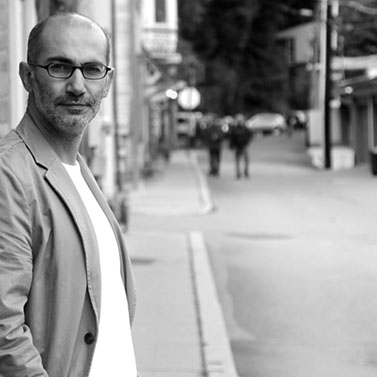
Kinan Abou-Afach
Kinan Abou-Afach is a cellist, oud player, composer, and recipient of the Pew Fellowship in 2013. The Syrian-born musician began his musical studies at the age of seven studying at the Arabic Institute of Music in Damascus, where he eventually joined the National Syrian Symphony Orchestra and performed with the Middle Eastern Ensemble.
Notes
Kareem Roustom — Embroidered Verses: Songs on Andalusian Poetry
Translations by Ahmad Almallah
Commissioned by Al-Bustan Seeds of Culture with the support of the Pew Center for Arts & Heritage. Premiered December 5, 2015 at Bryn Mawr College with the Al-Bustan Takht ensemble, directed by Hanna Khoury, and The Crossing, conducted by Donald Nally.
Embroidered Verses is a work that is steeped in tradition but also looks ahead. Tradition is a troublesome word when it comes to music. There is often this sense that there is a ‘purity’ to it. However, even a cursory investigation will show that any tradition is anything but pure. Rather, it is an amalgamation of, what was at some point, current practices that built on past practices and added to them. So, this is the sense of tradition that I hoped to imbue in my Embroidered Verses. The work is cast in four movements and each is based on a poem that is based on a theme that was common in the muwashshah. The first text is a descriptive text dealing with nature and extolling the beauty of Al-Andalus. The second text is simply a drinking song. However, it is a text that has already been set to music and is a well-known muwashshah by Aleppan composer Omar Al-Batsh, Qum Ya Nadim or Arise oh Drinking Companion. This re-setting of already-set text to new music is also part of the tradition and is a nod to Aleppo’s rich musical heritage. The third text is a love poem composed by a poetess, Umm Al-Kiram, and the final text is a war-themed poem. Each setting tries to give a sense of the text but also pushes it to its emotional limits. The settings also showcase the virtuosic capabilities of the takht (Arabic chamber group composed of oud, qanun, violin, cello, and percussion) and requires the choir to sing intricate harmonies as well as long embellished lines that use quarter tones.
Kinan Abou-afach — Of Nights And Solace: Fantasia on Andalusian Muwashshah Poetry
Translated by Ahmad Almallah
Commissioned by Al-Bustan Seeds of Culture with the support of the Pew Center for Arts & Heritage. Premiered December 5, 2015 at Bryn Mawr College with the Al-Bustan Takht ensemble, directed by Hanna Khoury, and The Crossing, conducted by Donald Nally.
As is commonly said in Arabic literary tradition, “The poet is entitled to what others are not.” /
يحق للشاعر ما لا يحق لغيره,
This is not a surprise when we look at the pre-Islamic era (Al-Jahiliyya) in the Arabian Peninsula, where poets were the “rockstars” and tribes used to celebrate having a poet among them, for the power of words that they possess, and the entertainment value that they provide. When looking into the classical poetry from the pre-Islamic era until Islam’s Golden Age, it is fascinating how much passion can be skillfully embedded in a single verse of poetry. The Andalusian era wasn’t an exception, poetry was still a valid art form, and entertainment was definitely needed in the society. That is, among other reasons, why the muwashshah developed and flourished during that era. The same powerful/meaningful words, but in modified rhythmic meters (buhur) and forms are used to make a poem that fits in musical sung form: a hint to the Verse-Chorus form.
Of Nights and Solace: A Fantasy on Andalusian Poetry is a virtual trip to Andalusia, a dive into love, passion, and beauty: love and lament for parting with a beloved one as in the first poem by Ibn Zuhr; love and tearful longing for the Creator, almost reproachful, by Sufi poet/philosopher Ibn Arabi; undeclared love and the difficulty of keeping this love in Ibn Isa Al-Khabbaz’s poem; a beautiful rhythmic poem by Al-Qazzaz, like a word play; and Sahl Bin Malik’s poem which gives a beautiful image about sunrise. It is as if the whole piece is telling a story that begins at sunset and ends at the break of day, featuring multiple characters, progressing from classical muwashshah style to a broken form that still hints to the muwashshah.
Musically speaking, it was hard to imagine this composition without the use of harmony and polyphony. Although harmony is usually not used in traditional Arab music, when quarter-tones are used with the right voicing it creates a very pleasant mass of sound. Polyphony is more forgiving, and the structure of Arabic Maqams (scales) welcomes something that is close to poly-tonality (when using Maqam’s ajnas simultaneously). The piece uses a wide range of harmonic styles, from simple to a complex/thick texture to reflect the mood of the piece, and has a canon-like section that begins and ends the piece along with a fugue in the middle of the piece.
